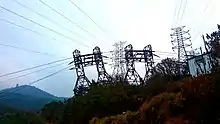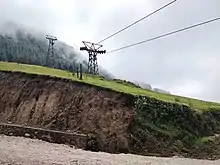Ropeways in Nepal, which mainly refers to the aerial ropeways, are used for human and cargo transport. In the ‘Nepal Country Report’ of 1976 by the world bank concluded that construction and maintenance of roads in mountainous are costly due to hilly terrain, and thus other means of transport should be studied mainly indicating to the ropeways. However, ropeways have not gained significant popularity over roadways. In the Ninth Five-year Plan ropeway was encouraged with and involvement of the private sector. But no provision in the national budget was made for ropeway development. Nonetheless, private sector has initiated the construction and operation of ropeways mainly in lucrative places such as religious temple.[1][2]
History
The first ropeway to carry cargo was Halchowk-Lainchour ropeway which was used to transport stones from the quarry to build palaces.[1] The famous, Dhorsing-chisapnai-Chandragiri ropeway passing into Kathmandu was built by Chandra Shamser Rana in 1922. It was upgraded in 1964 to reach to Hetauda with a total length of 42 km with technical and financial assistance from USAID.[2]
Types of ropeways in Nepal
Following are the types of ropeways based on the operation mechanism and types of transport.
Tar pul or Ghirling
Also known as twin, this kind of ropeways are rudimentary ropeways that are used as a bridge to cross the river. These are generally made by the local community based on necessity. As of May 2004, there are 25 Tar Pul in Kavre, Gorkha, Myagdi, Udaypur, Chitwan and Lamjung [2]

Gravity Ropeways
Gravity ropeway operates by using potential energy without electricity. A certain weight is dropped from higher elevation which pulls the smaller cargo from lower elevation to higher elevation.[3] This kind of ropeways was first used in Mustang to transportation apple. Since then it has made its way to four other locations, Gorkha, Tanahun, Kalikot and Achham.[1] Most of the construction ropeways fall in this category.
Cargo Ropeways
Cargo ropeways are used in Nepal to transport goods from one place to another. The first ropeway, Halchowk-Lainchour, was in fact a cargo ropeway. The most famous cargo ropeway was the Kathmandu-Hetauda Ropeway which is now out of operation.

Passenger ropeways
Mostly electrically operated, these kinds of ropeways, also called Cable Car is used to transport passengers. The first of this kind of ropeways was Manakamana Cable Car established in 1998.

List of ropeways in Nepal
This list does not include the smaller ghirlings which are more numerous.
| Name | Location (From - To) | Type (Cargo or Passenger) | Length (m) | Capacity | Description | Operation date (Start-End) | Current Status | Construction cost | Photo |
|---|---|---|---|---|---|---|---|---|---|
| Adhi khola ropeway [2] | Syangja | Cargo | 1200 | 300 kg | Used to transport construction material for Adhikhola Hydropower Project | 1985 | Non-functional | NPR 2.3 Million | No photo |
| Jimhruk khola ropeway[2] | Syangja, Madi-to construction sites | Cargo | 1200 | 800 kg | Used to transport construction material for Jhimruk Khola Hydropower Project | 1990 | Non-functional | NPR 3.5 Million | No photo |
| Khimti Ropeway [2] | Kirene- construction sites | Cargo | 2100 | Used to transport construction material for Khimti I Hydropower Project | Non-functional | NPR 35 Million | No photo | ||
| Hetauda Cement Factory Ropeway | Hetauda Quarry site-factory | Cargo | 11,000 | 150 tonn/hr | Used to transport stones | Non-functional | No photo | ||
| Bhattedanda Milkway [4] | Lalitpur, Bhattedada-Jhakridada | Cargo | 3022 | 450 kg | Used to transport milk and khuwa (खुवा) | 1995–2001, 2002- | Unknown | No photo | |
| Bharpak Ropeway [5] | Gorkha | Cargo | Used to transport general merchandise. Stopped working after the accident. | 1998-1999 | Non-functional | ||||
| Manakamana Cable Car | Chitwan | Passenger | 2772 | 600 person/hour | Transport to the Manakamana Temple from Prithvi Highway | 1998 | In operation | _to_Manakamana_Temple_(Nepal).jpg.webp) Manakamana Cable Car | |
| Chandragiri Cable Car | Kathmandu, Thankot to Chandragiri | Passenger | 2400 | 1000 person/hour | Transport to Bhaleshwor Mahadev temple | 2016 | In operation |  Chadragiri | |
| Tri Chandra Nepal Tara Ropeway (Kathmandu-Hetauda Ropeway) [1] | Kathmandu-Hetauda | Cargo | 42,300 | 22 tonn/day [6] | Used to transport cargo | 1964-1994 | Non-functional | No photo | |
| Dorsing-Chisapani-Kathmandu [1] | Kathmandu | Cargo | 22,000 | It was upgraded to Kathmandu-Hetauda Ropeway in 1964. Engineer was Dilli Jung Thapa. | 1922 | Non-functional | No photo | ||
| Halchowk-Lainchour [1] | Kathmandu | Cargo | 4,000 | Used to transport stones. | 1924 | Non-functional | No photo | ||
| Janagaun Gravity Ropeway [7] | Cargo | Used to transport food and medicines. Installed by Practical Action Nepal | 2005 | In Operation | No photo | ||||
| Bishaltar Gravity Ropeway [8] | Kathmandu | Cargo | Used to transport food and medicines. Installed by Practical Action Nepal. | 2007 | In Operation | No photo | |||
| Kalinchowk Cable Car [9] | Dolkha, (Kuri to Kalinchok Bhagawati Temple | Passenger | 1,000 | Passenger to the temple. | 2018 | In operation | |||
| Sangakot Cable Car [10] | Pokhara, Phewatal to Sarankot | Passenger | 2,500 | Passenger to the temple. | 2020 | Under construction | NPR 1 Arab and 10 Crores. | No photo | |
| Kharidunga mine ropeway | Dolakha, Sindhupalchowk (Kharidhunga to Lamosanghu) | Cargo | 10,300 | Transport talc and magnesium mine at Kharidhunga. | 2020 | Non-functional |  Kharidunga mine ropeway | ||
| Udayapur cement mine ropeway | Udayapur, (Sindhali-hill to factory) | Cargo | 13,800 | Transport limestone. | 1987 | In Operation | No photo |
Projects under consideration
Accidents and safety
- In cargo type ropeways, accidents are not fatal but include falling off of the bucket as in Adhi Khola ropeway and Jimruk Khola ropeways [2]
- Four people riding in the ropeway car died when the hauling cable snapped on 7 May 1999 at Bhapak Ropeway.[5]
- Chandragiri cable car stopped mid air for 10 minutes twice and 40 minutes in separate occasions in 2020 causing panic by passengers.[12]
See also
References
- 1 2 3 4 5 6 "Flying in a ropeway over Nepal - Nepali Times". Retrieved 2020-06-28.
- 1 2 3 4 5 6 7 Gywanwali, Deepak; Dixit, Ajaya; Upadhya, Madhukar (2004). Ropeways in Nepal. pp. 88–94.
- ↑ Aerial Ropeways of Nepal (PDF). Practical Action.
- ↑ Gywanwali, Deepak; Dixit, Ajaya; Upadhya, Madhukar (2004). Ropeways in Nepal. pp. 107–142.
- 1 2 Gywanwali, Deepak; Dixit, Ajaya; Upadhya, Madhukar (2004). Ropeways in Nepal. pp. 143–155.
- ↑ "Ropeway in Nepal - Cable Car in Nepal- Roam Around Nepal". My Blog. 2019-08-09. Retrieved 2020-06-28.
- ↑ "Gravity goods ropeway an alternative sustainable solution for rural transportation with out hampering to the natural environment and climate: A case study from Janagaun village". IOP Conference Series: Earth and Environmental Science. 6. 2009-02-01. doi:10.1088/1755-1307/6/20/202019.
- ↑ Parikh, Priti; Lamb, Andrew. Trade and Mobilityon the Rooftop of the World: GravityRopeways in Nepal (PDF). GDEE.
- ↑ "Kalinchok starts Nepal's third cable car service". Retrieved 2020-06-28.
- ↑ "Phewatal-Sarangkot cable car almost completed". Highlights Tourism. Retrieved 2020-06-28.
- ↑ Shrestha, A. (2018), Cable Car from Birethanti of Kaski to Muktinath, retrieved 17 May 2023
- ↑ "Chandragiri cable car stops midair, panicked customers demand refund". Retrieved 1 July 2020.